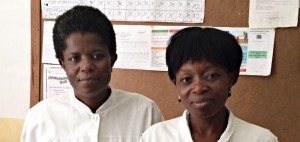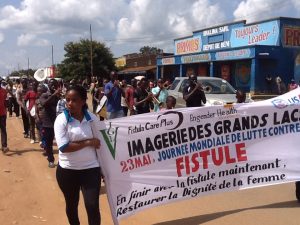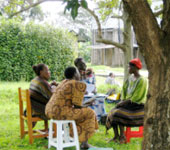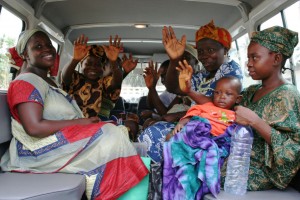2016 brought the Fistula Care Plus (FC+) project to the end of its third year. With only two years left in the project, it is an exciting time to review progress and push forward to ensure the best possible results. This year, USAID supported fistula treatment and prevention services through the FC+ project in six countries—Bangladesh, the Democratic Republic of the Congo (DRC), Niger, Nigeria, Togo, and Uganda. USAID also supports fistula activities in DRC, Ethiopia, Guinea, Mali, Pakistan, and Tanzania through bilateral funding. In 2016, EngenderHealth also formally supported fistula prevention and care activities in Guinea as part of the Jhpiego-implemented, USAID-funded Health Services Delivery (HSD) project.
Building Provider and Facility Capacity for Fistula Repair Services
O ne of the key priority areas of FC+ is strengthening provider and facility capacity to treat genital fistula. During 2016, surgical fistula repair was carried out at 37 project-supported sites. In total, FC+ is proud to have supported 3,514 surgical fistula repairs and 323 non-surgical repairs during the third year of the project. At the heart of this incredible effort is the health care providers, to whom FC+ is dedicated to continued capacity building. In 2016, 16 surgeons were trained in fistula repair and 1,414 additional health system personnel were trained in non-surgical fistula repair and prevention topics.
ne of the key priority areas of FC+ is strengthening provider and facility capacity to treat genital fistula. During 2016, surgical fistula repair was carried out at 37 project-supported sites. In total, FC+ is proud to have supported 3,514 surgical fistula repairs and 323 non-surgical repairs during the third year of the project. At the heart of this incredible effort is the health care providers, to whom FC+ is dedicated to continued capacity building. In 2016, 16 surgeons were trained in fistula repair and 1,414 additional health system personnel were trained in non-surgical fistula repair and prevention topics.
Fistula prevention activities include community engagement and education, ensuring access to family planning, enhancing maternity services including capacity for emergency obstetric care (EmONC), and encouraging women to deliver with skilled birth attendants who can act quickly in the instance of prolonged/obstructed labor. In total, 789 sites were supported in 2016 for prevention activities.
Advocating for the end of fistula
On May 23, FC+ commemorated the annual International Day to End Obstetric Fistula (IDEOF) across all country programs. At the international level, FC+ raised awareness on IDEOF and UNFPA’s call for “a fistula free generation” at both the World Health Assembly in Geneva and the Women Deliver conference in Copenhagen. Both presentations were conducted in collaboration with the G4 Alliance for Global Surgery, of which EngenderHealth is a board member.

FC+ is also proud to support and participate in national fistula working group meetings in Bangladesh, DRC, Uganda, and West Africa Region/Niger. These meetings are crucial platforms for policy discussions and key collaborations to strengthen the enabling environment for fistula programming. The ISOFS Conference held in October, 2016 in Abuja showcased an example of successful collaboration as the FC+-supported guideline document on catheterization for prevention and/or conservative treatment of fistula was officially launched by the Honorable Minister of Health and EngenderHealth. In Bangladesh, the continued strong working relationship between the MOH and FC+ led to the provision of technical guidance on the MOH-led Bangladesh Maternal Mortality and Morbidity Survey, which will enable partners working in maternal health care to have updated and reliable data on which to plan and evaluate interventions.
Partnerships within and across countries progressed during 2016 and new collaborations were born. Most notably, FC+ engaged pelvic floor physical therapists for trainings at Panzi Hospital in Bukavu, DRC, and collaborated with the Royal College of Obstetricians and Gynecologists (RCOG) on a training manual for evaluation and management of fistula, pelvic organ prolapse (POP), incontinence, and related pelvic floor disorders.
Enhancing Community Understanding and Promoting Positive Care-Seeking Behaviors
I n total, FC+ trained 679 community volunteers in tools and approaches to raise awareness regarding fistula prevention and repair during the year. This included training and outreach activities involving traditional and religious leaders in Uganda and Nigeria, village committees in Niger, and fistula champions in Bangladesh. By the end of 2016, FC+ had supported over 10,000 community awareness-raising activities through program staff and partners which reached over 6.5 million participants across all country programs.
n total, FC+ trained 679 community volunteers in tools and approaches to raise awareness regarding fistula prevention and repair during the year. This included training and outreach activities involving traditional and religious leaders in Uganda and Nigeria, village committees in Niger, and fistula champions in Bangladesh. By the end of 2016, FC+ had supported over 10,000 community awareness-raising activities through program staff and partners which reached over 6.5 million participants across all country programs.
Strengthening the evidence base
FC+ continued leadership in data collection and reporting using DHIS2, both by strengthening the platform at EngenderHealth and by providing technical assistance to partner organizations. The project also launched a Fistula Community of Practice in 2016, and hosted its first webinar focusing on the critical emerging issue of iatrogenic fistula. As in previous years, FC+ had a strong presence at international conferences, including the International FIGO Conference, GMNH Conference, Women Deliver, and ISOFS.
At the country program level, the project continues to stress the use of routine data for programmatic decision making across the project. Research continues in Uganda, including the implementation of TERREWODE study on psychosocial reintegration of women with fistula deemed incurable. In Nigeria, FC+ collaborated with the Federal Ministry of Health to develop and pilot new HMIS tools that include standard indicators for fistula treatment. Integration of fistula indicators into national health monitoring systems is an essential step for any country that seeks to reduce or ultimately eliminate fistula.
Addressing Barriers to Care for Women with Fistula
This year brought the completion of a communications assessment study in Nigeria, which highlighted key methods for communicating fistula and MNCH information as well as specific topics which need additional messaging moving forward. The analysis of this study informed a new communication strategy which the Nigeria team will move forward in 2017. Additionally, Nigeria and Uganda country teams embarked on formative research to investigate barriers faced by women seeking fistula treatment. Findings from this research has been published in two reports and briefs, and has informed the design of an intervention package and evaluation research plan in the two countries.
 As 2016 comes to a close, we want to acknowledge the dedication of FC+ staff and partners across the globe, included the thousands of health care providers working tirelessly to treat fistula clients and prevent new cases. Without your hard work, these incredible successes would not have been possible.
As 2016 comes to a close, we want to acknowledge the dedication of FC+ staff and partners across the globe, included the thousands of health care providers working tirelessly to treat fistula clients and prevent new cases. Without your hard work, these incredible successes would not have been possible.


